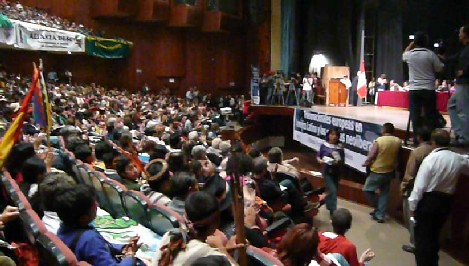The Judgement of the Permanent People’s Tribunal, May 2010

In May 2010, the Permanent People's Tribunal met in Madrid to hold its session on 'The European Union and Transnational Corporations in Latin America: Policies, Instruments and Actors Complicit in Violations of the Peoples' Rights'.
In this session, the TPP examined two cases on human rights violations owing to agrofuels (Agrenco and Louis Dreyfus in Brazil) and considered the arguments challenging the Renewable Energy Directive (RED) adopted by the EU in 2009 under a human rights perspectives.
Since the introduction of the Renewable Energy Directive (2009/28/EC), the share of renewable energy sources in EU energy consumption has increased from 12.5% in 2010 to 23% in 2022. The Renewable Energy Directive EU/2018/2001 was revised in 2023. It sets an overall renewable energy target of at least 42.5% binding at EU level by 2030 - but aiming for 45%.
The final judgement of the TPP recognises that the extension of monocultures for agrofuels is the cause for cultural aggression against and the invasion of indigenous peoples' territories in addition to the destruction of their environment and traditional practices.
The production of agrofuels is denounced also as cause of destruction of the environment and vital resources through the overexploitation of ground water resources.
In considering many cases, among which, those on agrofuels, the PPT recognised "the appearance of a new category of rights violations relating to nature and to harm to future generations, based on the concepts of ecological debt and climate justice."
The PPT recognises the complicity of the EU in the human rights violations, particularly of the right to food, caused by the production of agrofuels, since the quota approved for the use of agrofuels in transport makes obligatory for Member States to produce agrofuels (RED 2009). Under the Renewable Energy Directive, EU countries are obliged to ensure that the share of renewable energy in the final consumption of energy in transport is at least 14% by 2030, including a minimum share of 3.5% of advanced biofuels.
Among the others recommendations the PPT gave, following its sentence : it calls on EU institutions "to apply the precautionary principle under Article 191 of the Treaty on the functioning of the European Union and to impose a moratorium on the increase in the use of biofuels, suspending the 2003 and 2009 directives which promote biofuels, until the impacts of the said decisions on food production and deforestation, among others, have been assessed in detail."
The Madrid 34th session of the Permanent Peoples’ Tribunal (PPT), completed a process initiated in May 2006 in Vienna, where the PPT accepted the petition of the Enlazando Alternativas Bi-Regional Network for an investigation into how the policies of transnational corporations (TNCs) and the specific role of the European Union (EU) in its relations with Latin American and Caribbean countries gave rise to violations of human rights and the peoples’ right self-determination.

